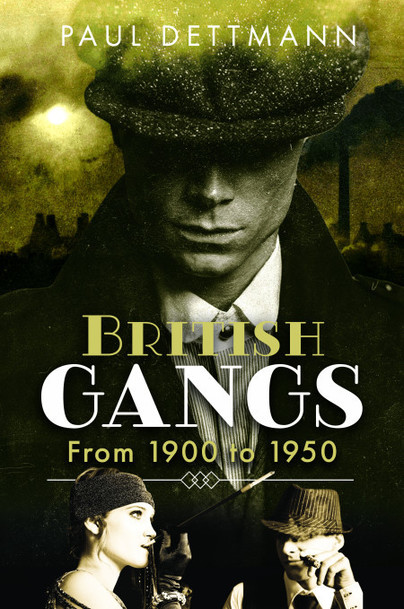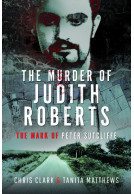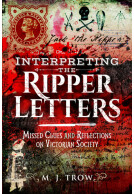British Gangs (Hardback)
From 1900 to 1950
Imprint: Pen & Sword True Crime
Pages: 176
Illustrations: 32 mono
ISBN: 9781399073875
Published: 16th October 2024
(click here for international delivery rates)
Order within the next 5 hours, 53 minutes to get your order processed the next working day!
Need a currency converter? Check XE.com for live rates
| Other formats available | Price |
|---|---|
| British Gangs ePub (3.6 MB) Add to Basket | £14.99 |
British Gangs covers the first fifty years of the twentieth century, a time of upheaval and war during which the public came to fear groups of young men. Much of this fear was whipped up by an expanding newspaper industry trying to increase sales with alarming and salacious stories. The book finds that the gangs were not as big a menace as the public were led to believe, but their activities are no less thrilling or important in the present day. This is a gripping account of one aspect of working class life.
It covers the better-known gangsters of the time such as the McDonalds, Sabinis and Cortesis, Alf Solomon and Billy Kimber, but also, as a result of days spent in newspaper archives, uncovers many stories as they were reported at the time. Car and bus chases, gun battles, shoplifting, violent activity at sporting events, simple street con artists and more are all included in this trove of gang stories, most of which have been forgotten.
The book covers many lesser-known incidents and stories from Britain's gangs, including a look at female criminals such as Alice Diamond, Mary Carr, Florrie Holmes, Kathleen Cooper and Josephine O'Dare, and the successful nightclub owner Kate Meyrick. Gangs from around the country are included, in cities including Manchester, Liverpool, Glasgow, Hull, Sheffield, Newcastle, Leeds, Belfast and Dublin, as well as the more often-covered Birmingham and London. Prison time also features, as an important part of a criminal's life that is not often included in books on gangsters. This is an important contribution to the recorded history of British gangs.
A fascinating insight into 'Gangs' from the beginning to mid-century. It's a recommended read.
NetGalley, Wendy M Rhodes
A fascinating guide into the criminal masterminds that led us into the 20th century. The approach is informative as well as entertaining.
NetGalley, Jo Shelley
British Gangs is a gripping, well-researched, and nuanced account of early 20th-century gang culture in Britain. Whether you’re a history enthusiast, true crime aficionado, or simply curious about the gritty underbelly of Britain’s cities during this era, this book delivers a trove of forgotten stories and fresh perspectives. An essential read for anyone interested in the intersection of crime, class, and culture.
NetGalley, Joanne Ellis
Paul Dettman’s British Gangs: From 1900 to 1950 is a meticulously researched exploration of gang culture in early 20th-century Britain, shedding light on a shadowy and often misunderstood aspect of social history. With its detailed accounts of infamous figures and events, this book bridges the gap between academic research and accessible storytelling, making it an engaging read for true crime enthusiasts and history buffs alike.
NetGalley, Katy Page
Dettman paints a vivid picture of the turbulent decades when urban poverty, industrial decline, and shifting social dynamics gave rise to notorious gangs like the Birmingham Peaky Blinders and the Glasgow Razor Gangs. He skilfully contextualises the rise of these groups, connecting their activities to the broader socio-economic changes of the time, including the impact of two World Wars and the struggles of working-class communities.
The book’s greatest strength lies in its depth of detail. Drawing on court records, contemporary journalism, and firsthand accounts, Dettman provides a compelling narrative of crime, violence, and survival in the gritty underbelly of British cities. He goes beyond the sensationalist aspects of gang life to explore their cultural significance, from the role of fashion and identity in gang membership to the interplay between gangs and law enforcement. His section on female gangsters is particularly fascinating as it is rare for a book to discuss female gangsters or the role of women within gangs...
Whether you’re a fan of historical crime, a lover of gritty social history, or simply curious about the real stories behind fictionalised depictions of gangs, this book offers a gripping and thought-provoking read.
Rating: 5 out of 5 stars
NetGalley, Madison Loveday
*British Gangs* by Paul Dettmann offers an insightful, well-researched dive into the world of gang culture in Britain, presenting a nuanced look at the socio-economic factors that shape it. Dettmann combines historical context with personal stories, making the book both informative and engaging. His writing style is clear and direct, capturing the complexity of gang life without sensationalism, which is refreshing and thought-provoking. This book is an eye-opener for readers interested in understanding the roots and realities of gang influence in British society. A compelling read for anyone interested in sociology, criminology, or contemporary British culture.
Paul Dettmann’s “British Gangs: From 1900 to 1950” offers a riveting exploration of the underworld that shaped Britain’s early 20th century. This meticulously researched book delves into the lives and crimes of notorious gangs, providing a comprehensive look at a turbulent period in British history.
NetGalley, J. Kromrie
Dettmann’s approach is scholarly and engaging, making the book accessible to both academics and general readers. He covers a wide range of gangs, from the infamous Peaky Blinders to lesser-known female criminals. The book is structured chronologically, allowing readers to see the evolution of gang culture and its impact on British society.
“British Gangs” focuses on individual stories that bring the era to life. Dettmann provides detailed accounts of key figures, their rise to power, and their eventual downfall.
The book explores themes of power, poverty, and social upheaval. Dettmann examines how economic hardship and war contributed to the rise of gangs, and how these groups both exploited and protected their communities.
Dettmann’s writing is clear and compelling, with a narrative style that keeps readers engaged. His attention to detail and ability to weave historical facts into a cohesive story make the book both informative and entertaining. The use of primary sources, including police records and contemporary newspaper articles, adds authenticity to the stories.
“British Gangs: From 1900 to 1950” is a fascinating and well-researched book that sheds light on a dark and often misunderstood part of British history.
Paul Dettmann has created a work that is educational and captivating, making it a must-read for anyone interested in true crime, social history, or the complexities of human behavior.
This is an interesting collection of stories about gangs from the turn of the century to mid century. It looks at a selection of them from around England, Scotland and Ireland. What makes this fascinating reading is the way they differ from American gangsters who are also represented in the book. Guns were generally not a factor although the gangs could be every bit as violent and intimidating as the ones across the pond...
NetGalley, Susan Johnston
Clearly the author has researched his topic well and presents a cogent and convincing document.
Rating: 5 out of 5 stars
NetGalley, Karen Bull
Brilliant book, love gang land history. This book brings to life the gangs and what happened.
Well written and researched.
Definitely worth reading great book for gift.
About Paul Dettmann
Paul Dettmann has always been interested in true crime. He revived his interest during the year of lockdown, getting hooked on Michelle McNamara's hunt for the Golden State Killer. He was inspired to start the blog, Crime Guy, to document some of the cases that affected him as a child, and other more recent unsolved cases. The success of Peaky Blinders inspired him to look into the lives of British gangsters from the early twentieth century. This is his first book of nonfiction.














